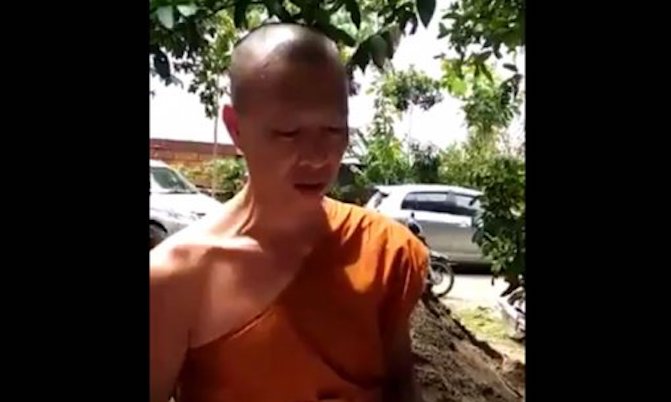A viral video showing a Buddhist monk agreeing to banishment from a village in Tangerang Regency has become the subject of major controversy in Indonesia over the past few days, yet the only criminal investigation being pursued by police has nothing to do with religious persecution.
On Feb. 4, Mulyanto Nurhalim, a 43-year-old monk who has lived alone in Babat Village in the Legok District since 2010, was visited by a group of locals who accused him of preaching Buddhism in the village. The next day, on the grounds that Mulyanto’s house did not have a religious worship permit, the locals made Mulyanto read out and sign a statement saying that he will leave the village within the week while promising not to promote Buddhism there ever again.
Video footage of Mulyanto reading the statement went viral over the weekend, and a snippet of the video can be seen at the beginning of the CNN Indonesia report below.
After the video went viral, the local police said that there was no religious persecution against the monk and that the matter — which was chalked off as a “misunderstanding” — was actually resolved swiftly and diplomatically.
According to the police, the locals mistakenly thought that the monk was preaching Buddhism because he was often visited by followers of the faith, who would bring food to his home and, in return, be blessed by him.
“This is understandable, because the monk is not allowed to have money and buy his own food,” said Ahmad Alexander, head of the Crime Investigation Unit at the South Tangerang Police, as quoted by Beritagar.
The police said they later brought Mulyanto, the locals, and Islamic leaders in the area together for a mediation session, in which the air was cleared and the monk was allowed to resume living in the village.
However, the police are now pursuing the uploader of the video for spreading religious unrest.
“We want to ask what the intention was for spreading the video,” Murodih, head of the Legok District Police Department, was quoted as saying yesterday by Tempo.
“This issue is being talked about again after it became viral on social media even though the situation here has returned to normal.”
Spreading religious unrest, under the highly controversial and ambiguously worded Information and Electronic Transactions Act (UU ITE), is punishable by up to four years’ imprisonment.
There is actually also a law against prohibiting others from performing religious worship, violation of which is punishable by up to one year and four months in prison. However, the law states that such religious activities can only be carried out in government-licensed places of worship, which has in the past opened up followers of minority religions to discrimination and persecution.





